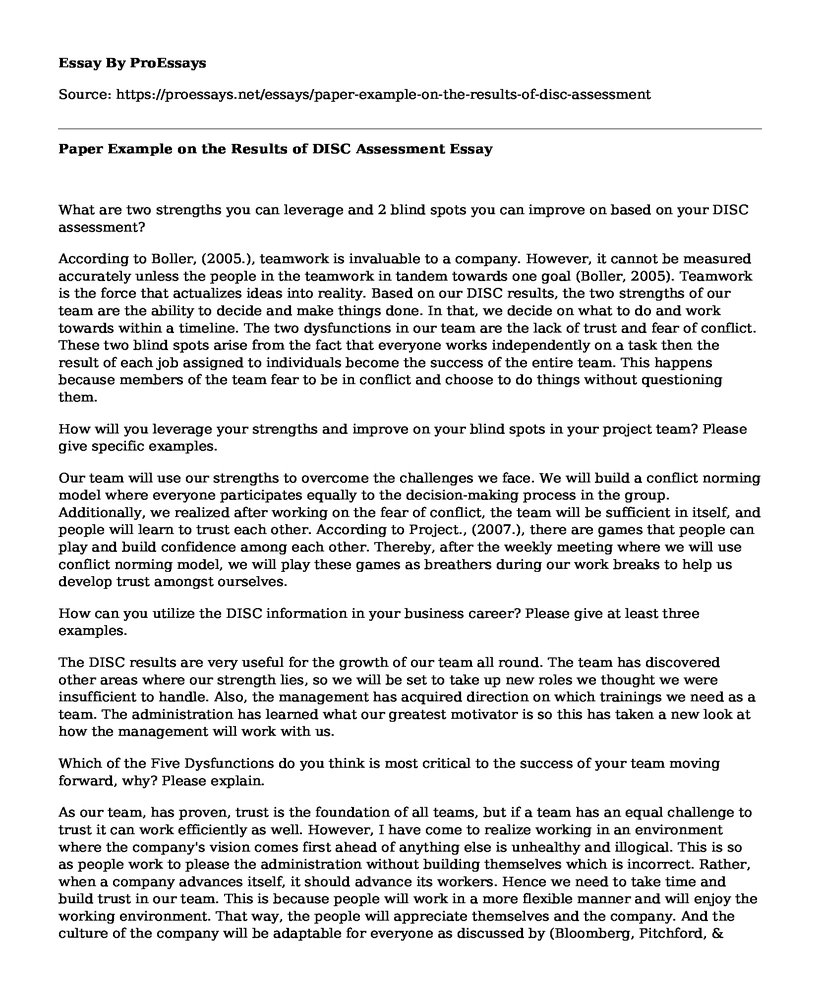What are two strengths you can leverage and 2 blind spots you can improve on based on your DISC assessment?
According to Boller, (2005.), teamwork is invaluable to a company. However, it cannot be measured accurately unless the people in the teamwork in tandem towards one goal (Boller, 2005). Teamwork is the force that actualizes ideas into reality. Based on our DISC results, the two strengths of our team are the ability to decide and make things done. In that, we decide on what to do and work towards within a timeline. The two dysfunctions in our team are the lack of trust and fear of conflict. These two blind spots arise from the fact that everyone works independently on a task then the result of each job assigned to individuals become the success of the entire team. This happens because members of the team fear to be in conflict and choose to do things without questioning them.
How will you leverage your strengths and improve on your blind spots in your project team? Please give specific examples.
Our team will use our strengths to overcome the challenges we face. We will build a conflict norming model where everyone participates equally to the decision-making process in the group. Additionally, we realized after working on the fear of conflict, the team will be sufficient in itself, and people will learn to trust each other. According to Project., (2007.), there are games that people can play and build confidence among each other. Thereby, after the weekly meeting where we will use conflict norming model, we will play these games as breathers during our work breaks to help us develop trust amongst ourselves.
How can you utilize the DISC information in your business career? Please give at least three examples.
The DISC results are very useful for the growth of our team all round. The team has discovered other areas where our strength lies, so we will be set to take up new roles we thought we were insufficient to handle. Also, the management has acquired direction on which trainings we need as a team. The administration has learned what our greatest motivator is so this has taken a new look at how the management will work with us.
Which of the Five Dysfunctions do you think is most critical to the success of your team moving forward, why? Please explain.
As our team, has proven, trust is the foundation of all teams, but if a team has an equal challenge to trust it can work efficiently as well. However, I have come to realize working in an environment where the company's vision comes first ahead of anything else is unhealthy and illogical. This is so as people work to please the administration without building themselves which is incorrect. Rather, when a company advances itself, it should advance its workers. Hence we need to take time and build trust in our team. This is because people will work in a more flexible manner and will enjoy the working environment. That way, the people will appreciate themselves and the company. And the culture of the company will be adaptable for everyone as discussed by (Bloomberg, Pitchford, & Hattie, 2017).
Select two of the Five Dysfunctions/Functions and identify strategies for actually practicing that role in a project team. For instance, if you select "Trust", what are 2-3 ways you can build trust on a team?
The two basic expectations that are a team are expected to meet are results and accountability. Building results from a group of people may cause friction between individual or poor working relations. Thus, enabling people to work in their full capacity should be a consideration so that everyone can be accountable and results-oriented. The results come by employing individuals who are good at learning and have basic knowledge of the particular skill. Hence companies are advised to have training for new employees. Accountability comes by clearly defining roles in a team so that if a team fails, then it is easy to point out who or what failed as shown by Browning, (2012). Lastly, accountability is built from people's ability to ask for assistance when it is needed. Therefore teams need people who are readily available to sort what they cannot handle in their capacity.
References
Bloomberg,:. P., Pitchford, B. E., & Hattie, J. (: 2017.). Leading impact teams: building a culture of efficacy / Paul Bloomberg, Barb Pitchford; foreword by John Hattie. : Thousand Oaks, California: Corwin, a SAGE Company, .
Boller, S. ( 2005.). Teamwork training. Alexandria, Va. : : ASTD Press, .
Browning, H. (2012). 7 Ways to Build Accountable Organizations. Forbes, 1.
Project., E. C. ( 2007.). Building trust in diverse teams: the toolkit for emergency response. Oxford, England: Oxfam GB, .
Cite this page
Paper Example on the Results of DISC Assessment. (2021, Apr 05). Retrieved from https://proessays.net/essays/paper-example-on-the-results-of-disc-assessment
If you are the original author of this essay and no longer wish to have it published on the ProEssays website, please click below to request its removal:
- Reinforcing New Behaviours Case Study
- Paper Example on Leadership Theories
- Limitations of the Value Creation Wheel Essay
- Leadership Approaches and Organizational Change Essay
- Organizational Behavior and Motivation Paper Example
- Research Paper on Operation Project Management: Oman Telecommunications Company
- Essay Example on Effectively Harnessing Team Collaboration for IT Management







